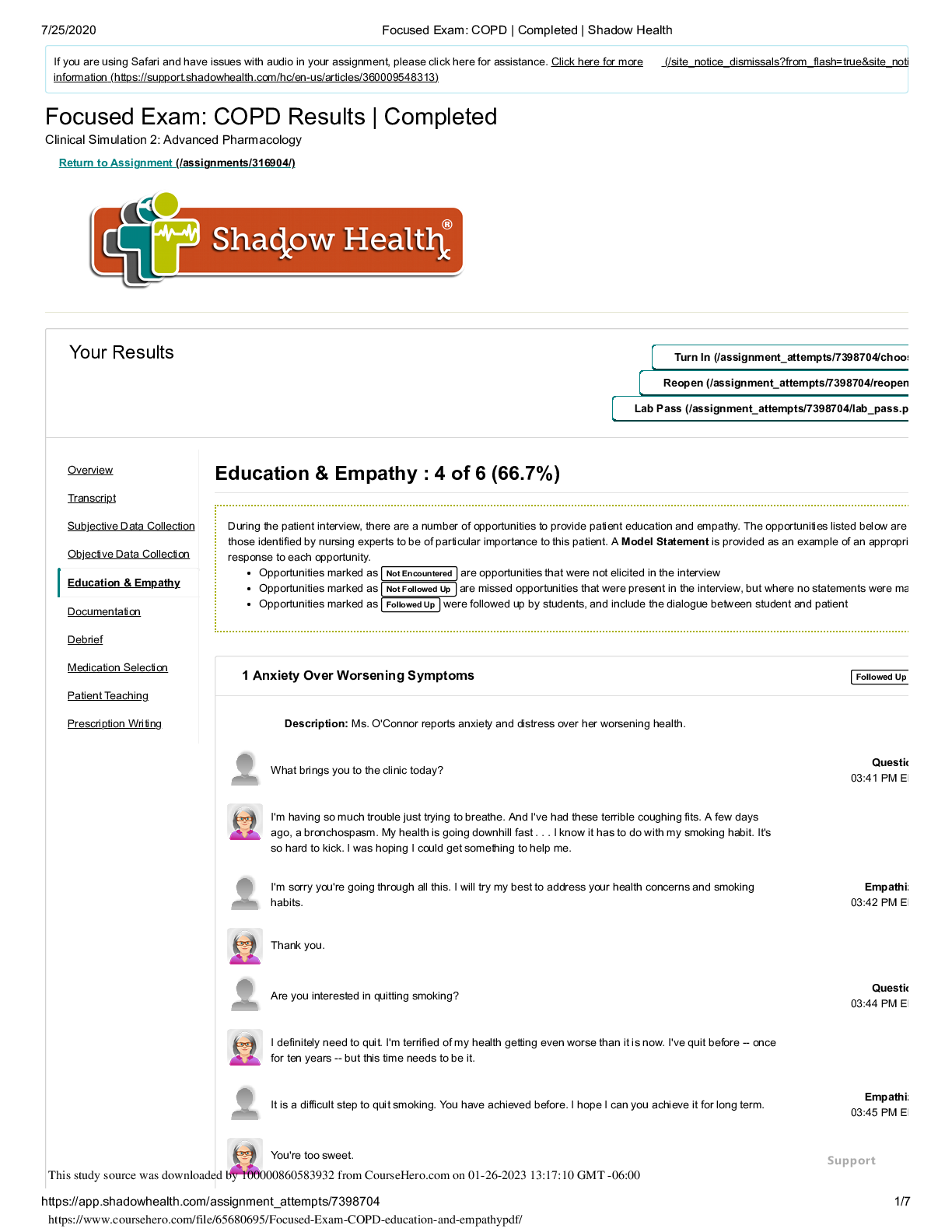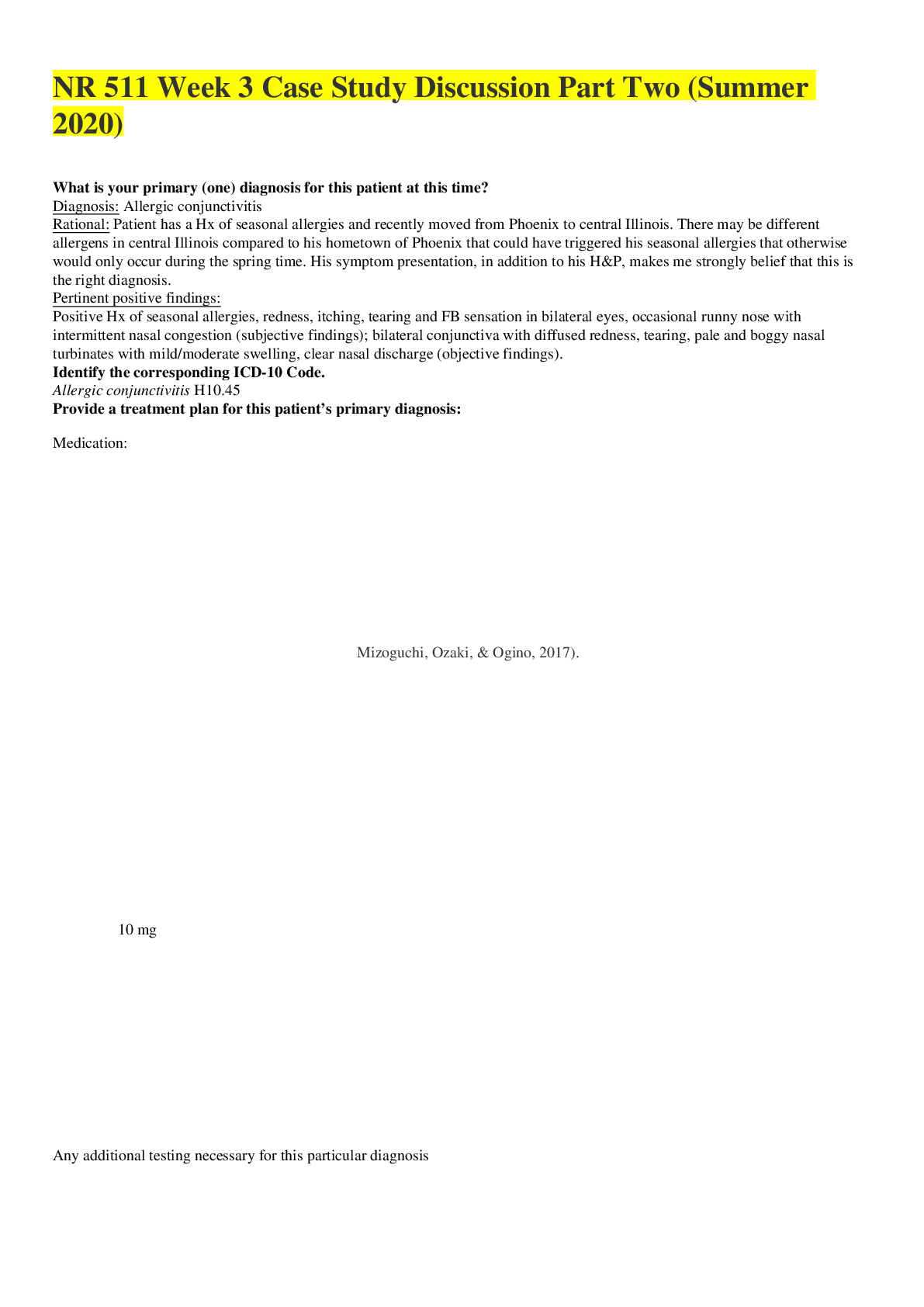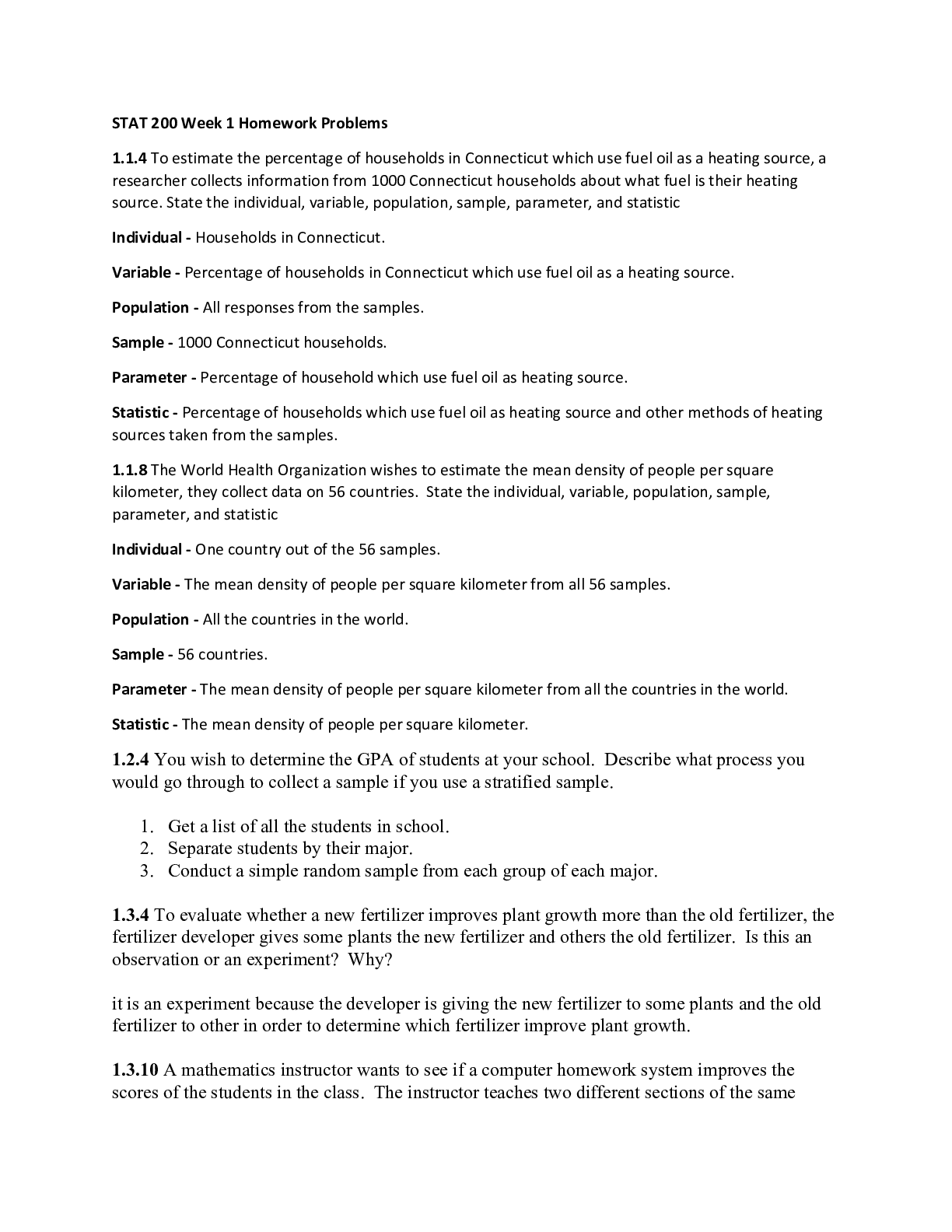*NURSING > STUDY GUIDE > NR 603 Week 3 Case Discussion: Cardiovascular - Latest Spring 2020 complete solution. (All)
NR 603 Week 3 Case Discussion: Cardiovascular - Latest Spring 2020 complete solution.
Document Content and Description Below
Week 3 Discussion Questions: 1. What Leads Demonstrate the ST Depression? ST depression is indicative of acute myocardial ischema and hypoxia. Heart failure may cause ST depression and this is seen... in leads V2, V3, V4, V5, and V6 (Klabunde, 2016; Harhash et al 2017). These depressions are horizontal or downsloping. 2. Is Lorene Hypertensive per ACA 2017 Guidelines? Compare the ACA guidelines to JNC 8 guidelines and discuss what treatment you recommend for her BP and why. Lorene’s blood pressure is 146/90, she is a 60 year old African American female with a history of hypertension, dyslipidemia, gestational diabetes x 3, and metabolic syndrome. Yes Lorene is hypertensive based on the ACC/AHA guidelines since her BP is greater than 130/80 and she has a high cardiovascular disease risk (Mutner et al, 2017). Compared with the JNC 8 guideline, the 2017 ACC/AHA guideline recommends using lower systolic blood pressure (SBP) and diastolic blood pressure (DBP) levels to define hypertension which means systolic less than 130 mm Hg and diastolic less than 80 mm Hg (Mutner et al, 2017). The JNC 8 guidelines establish treatment for persons aged 60 years and older with a BP goal of less than 150/90 mm Hg (James et al, 2014). For persons 30 years through 59 years old should maintain a diastolic goal of less than 90 mm Hg and a goal of 140/90 mm Hg based on their physcian’s expert opinion (James et al, 2014). This study source was downloaded by 100000860583932 from CourseHero.com on 01-28-2023 01:09:34 GMT -06:00 https://www.coursehero.com/file/142255819/NR-603-week-3-discussiondocx/ 2 The 2017 ACC/AHA guidelines recommend combination therapy for all patients in stage 2 hypertension like Lorene. A recent study in Hypertension (Jaejin et al, 2021) found that a higher percentage of patients on combination therapy including an ACEI-thiazide diuretic compared with patients on monotherapy reached their blood pressure goals and achieved BP control. Participants on combination ACEI-thiazide diuretics also had better medication adherence, reduced treatment inertia, and lower cardiovascular events compared to monotherapy participants. Lorene will start combination therapy to meet the ACC/AHA guidelines with one generic combination pill Lisinopril/hydrochlorothiazide 12.5 mg/10 mg to start and continue diet and exercise. 3. What is the Primary diagnosis causing Lorene's chest pain? Include ICD 10 codes (no differentials) Angina pectoris, unspecified (ICD-10 code I20.9)- Disease can be diagnosed based on an ECG, clinical exam, or cardiac imaging (Thadani, 2016). 4. What other secondary diagnoses does Lorene have that should be addressed? (Include the rationale and a reference for your diagnoses) Hypertension (ICD-10 code I10)- Lorene’s BP is 146/90 and pulse is 70 and she has an increased risk of CVD along with lower extremity edema so she meets both guidelines by the ACC/AHA and JNC 8. All adults recommended by the JNC 8 for hypertensive medication is also recommended by the ACC/AHA guidelines and considered to have hypertension. Adults with a high CVD risk or 65 years old and older with SBP of 130- 139 mm Hg or DBP of 80-89 mm Hg are recommended for taking antihypertensive This study source was downloaded by 100000860583932 from CourseHero.com on 01-28-2023 01:09:34 GMT -06:00 https://www.coursehero.com/file/142255819/NR-603-week-3-discussiondocx/ 3 medication (Muntner et al, 2018). The ACC/AHA guideline is treating SBP/DBP to a goal of <130/80 mm Hg (Munter et al, 2018) Hyperlipidemia, unspecified (ICD-10 code E78.5)- Lorene’s total cholesterol is 230 mg/dL (120-240 mg/dL normal range), triglycerides 180 mg/dL (0-200 mg/dL normal), LDL 180 mg/dL (62-130 mg/dL normal), and HDL 38 mg/dL (35-135 mg/dL normal). Total cholesterol, LDL (bad cholesterol), and HDL (good cholesterol) will be assessed along with the triglyceride level in some cases and a diagnosis will be made ( NIH, 2018). Lorene’s bad cholesterol (LDL) is elevated at 180 mg/dL and the HDL, triglycerides, and cholesterol are all boarderline. Based on a lipid profile screening for women every 1-2 years the cholesterol levels will be assessed along with a medical and family history and physical exam to diagnose hyperlipidemia. Lorene’s mother died of a stroke due to complications of type 2 diabetes and siblings also have metabolic syndrome. Metabolic Syndrome (ICD-10 code E88.81)- The NIH (n.d) defines metabolic syndrome as having 3 of the 5 following risk factors: large waistline of 35 inches or more for women (apple shaped body type), high triglyceride level of 150 mg/dL or higher, low HDL level of less than 40 mg/dL, high blood pressure of over 130/85 mm Hg, and a fasting glucose level of 100 mg/dL or higher (normal is less than 100 mg/dL). Lorene has BMI of 33.5, hypertension, triglyceride level of 180 mg/dL, HDL level is less than 40 mg/dL, and a fasting glucose of over 100 mg/dL which was 135 mg/dL so she is positive for metabolic syndrome. Her siblings also have metabolic syndrome. 5. Design a treatment plan and discuss how each intervention is applicable to Lorene's case. Consider the following interventions: This study source was downloaded by 100000860583932 from CourseHero.com on 01-28-2023 01:09:34 GMT -06:00 https://www.coursehero.com/file/142255819/NR-603-week-3-discussiondocx/ 4 Labs- Order lipid panel (repeat in 2- 4 weeks and ensure patient is fasting), HA1C (redraw in 3 months), fasting glucose, fructosamine, renal panel (includes glucose, phosphorus, Ca, creatinine, BUN, bicarbonate, albumin, K, Na, Cl, CO2, anion gap, eGFR, total protein, and BUN: Cr ratio) and liver panel (ALT, ALP, AST, bilirubin, and total protein) (NIH, n.d.: NIH, 2018). Durable Medical Equipment Diagnostic tests- Repeat ECG each year and a take home sphymomanometry to measure BP daily and record for review at the next appointment. Consult with endocrinologist on metabolic syndrome plan with using pioglitazone and not using metformin. Medications (allergic to Metformin- GI upset): RX: Aspirin 81 mg- Antiplatelet prophylactically (Vallerand & Sanoski, 2021). Sig: Take 1 chewable tablet PO once a day Dispense: OTC no script needed RX: Nitroglycerin 0.3 mg- Nitrate that relaxes the blood vessels and increases the blood supply to the heart and also reduces the hearts workload [Show More]
Last updated: 2 years ago
Preview 1 out of 8 pages

Buy this document to get the full access instantly
Instant Download Access after purchase
Buy NowInstant download
We Accept:

Reviews( 0 )
$12.00
Can't find what you want? Try our AI powered Search
Document information
Connected school, study & course
About the document
Uploaded On
Jan 28, 2023
Number of pages
8
Written in
Additional information
This document has been written for:
Uploaded
Jan 28, 2023
Downloads
0
Views
72

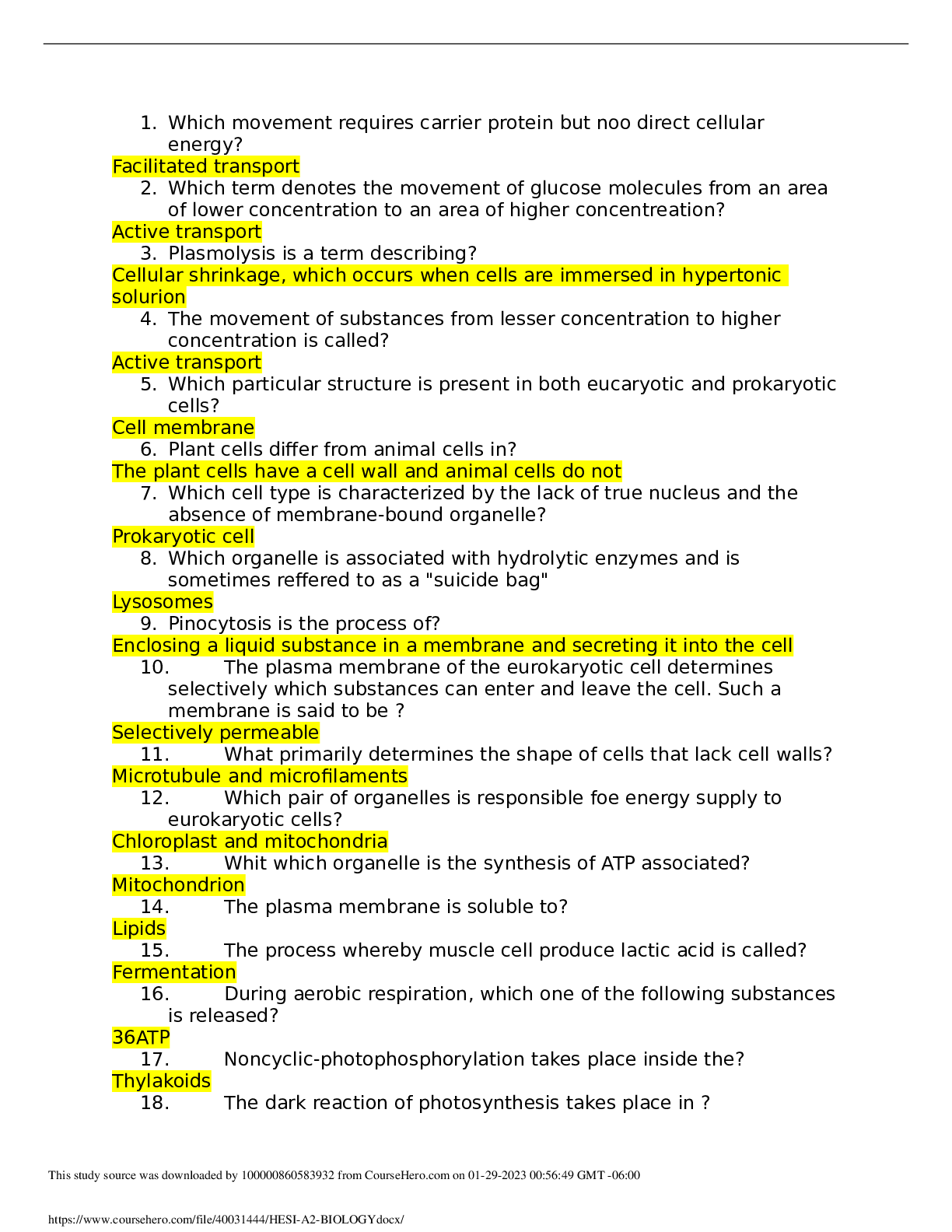
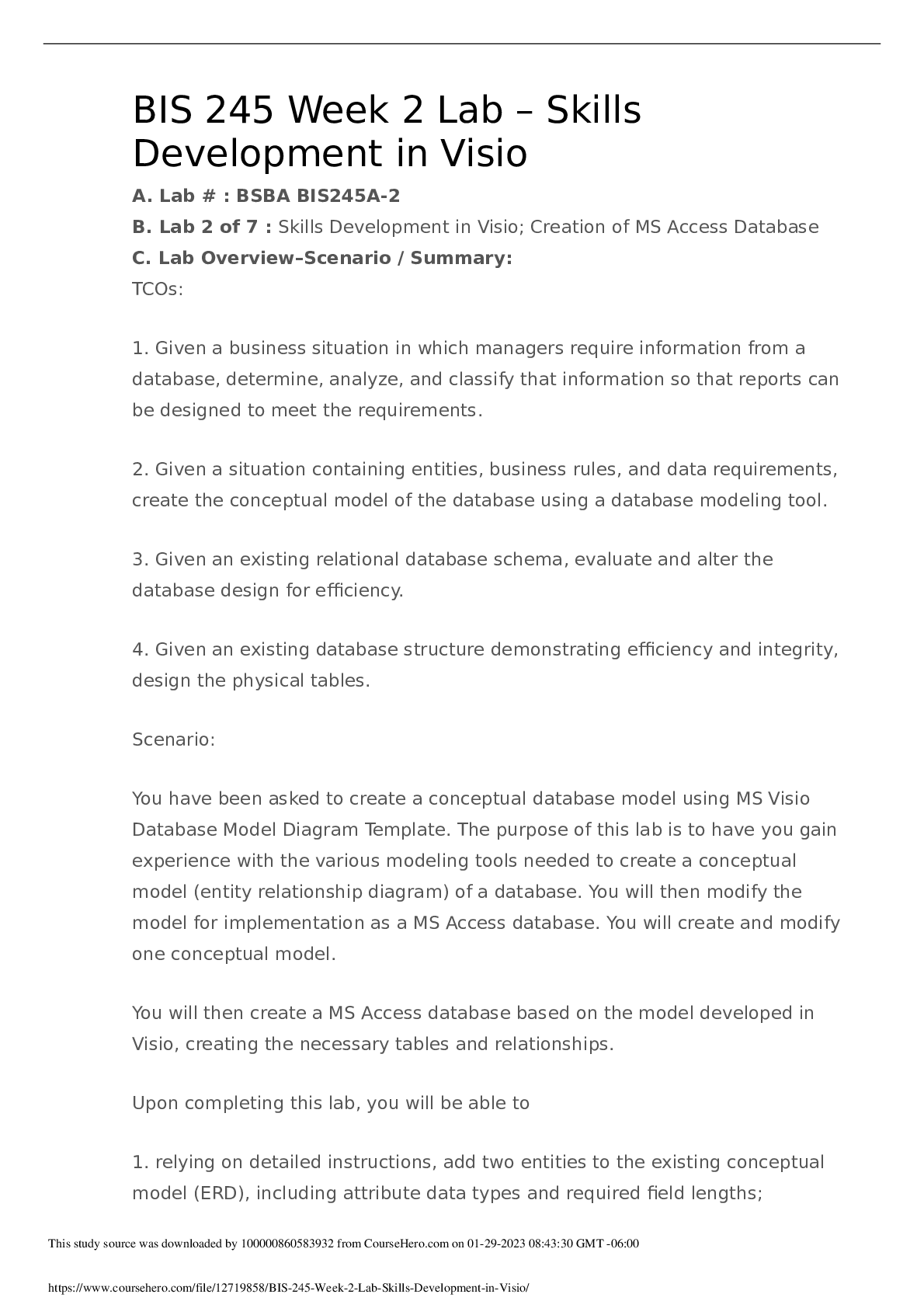
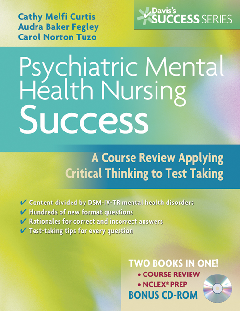
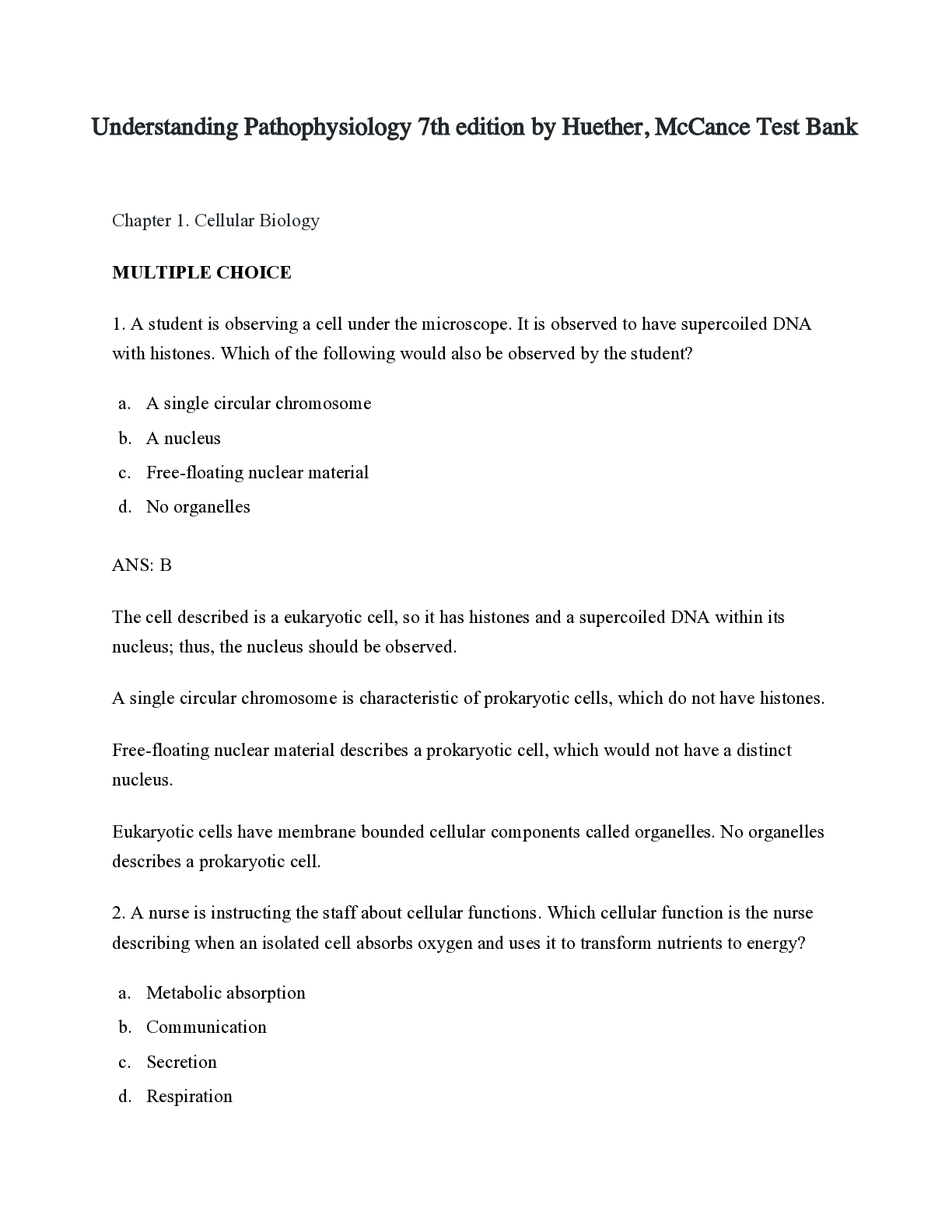
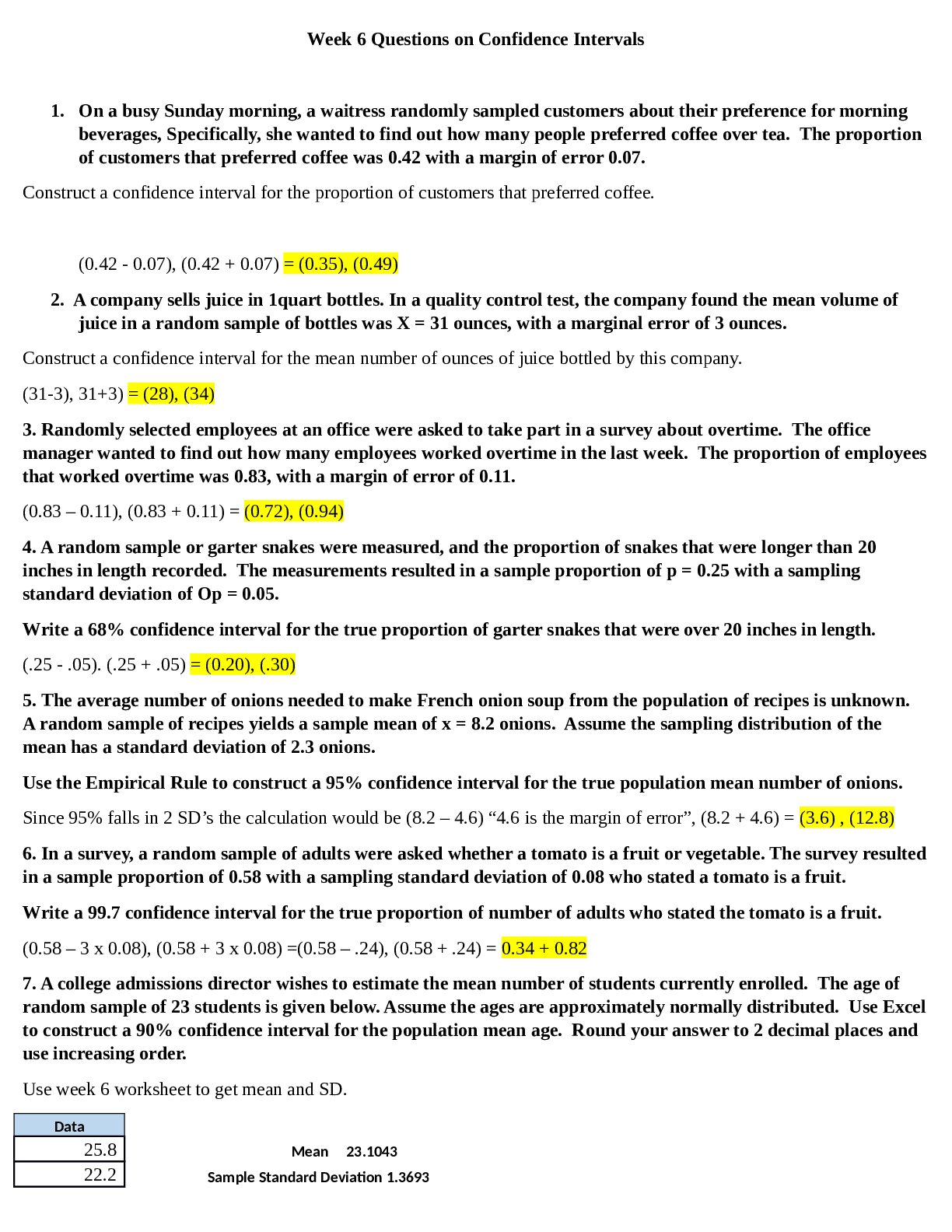


.png)


